XDS Statistics - January 2024
After my previous article about XDS and data availability I thought it be insightful to add some real statistics from the Dutch XDSCloud network. The Founda Health XDSCloud is a "XDS as a service" solution where a healthcare institution is provided a full "IHE XDS stack" including a registry, repository, audit record repository, XCA gateway, and consumer as a managed service. Connections to an institution's EMR, RIS/PACS or other "data source" are included such that each registry indexes various types of clinical information (diagnostic images, reports, patient summaries, lab result, etc). Health institutions are "connected" via XCA gateway services, and health information is only shared when patients have given their (explicit) consent as mandated by Dutch law.
To better understand the "value" the XDSCloud solution offers we have defined 4 "key performance indicators"(KPIs).
KPI 1 - Registered Document Volume
This KPI gives insights into the total amount of XDS documents that are available within the XDSCloud infrastructure. Since each XDS document represents a certain type of clinical information it is broken down into different document types. Each type refers to a specific (set of) XDS document formatCodes (e.g. DICOM Key Object, Medical Summary, Basic Patient Privacy Consent, etc.)
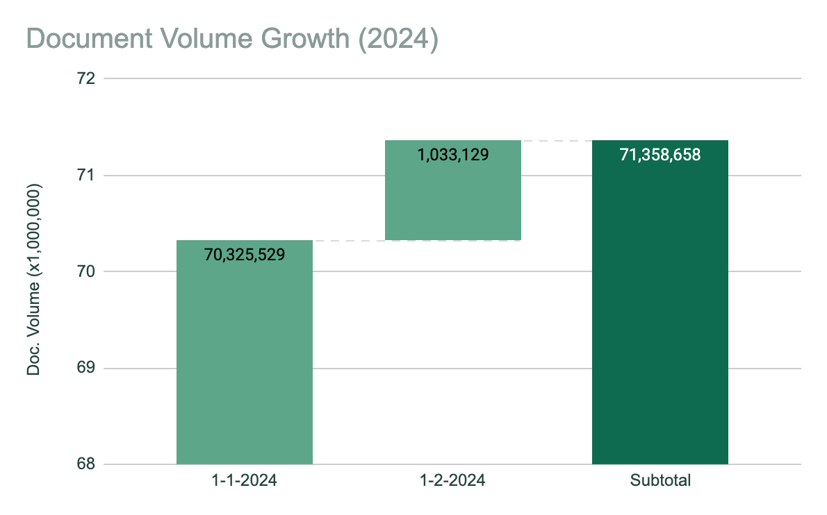
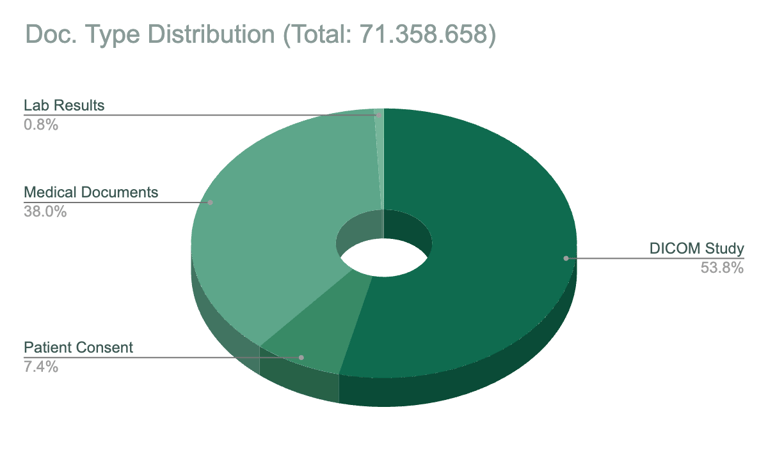
Per Jan. 1st 2024 all 27 health institution had registered over 70 million documents combined. Through the month of January a little over 1 million were added. The majority of the registered documents represented DICOM studies (i.e. XDS-I).
KPI 2 & 3 - Total number of exchanged DICOM Studies & (XDS) Documents
These KPIs gives insights into the amount of DICOM Studies and Documents that are exchanged across different healthcare institutions that are part of the XDSCloud infrastructure. It does not include any exchanges within a healthcare enterprise. Only the "provide" volume is counted as an indication of the total volume that healthcare institutions share among each other. Each provided study of document is either received by another XDSCloud node, or is received by a healthcare institution in an external network outside the XDSCloud infrastructure.
The first diagram shows the amount of DICOM studies exchanged over period of three months. December is a bit lower that November and January. The second diagram shows a similar picture for the amount of exchanged (XDS) documents. The exchange document volume is approx. 6-7 times higher than the amount of DICOM studies exchanged.
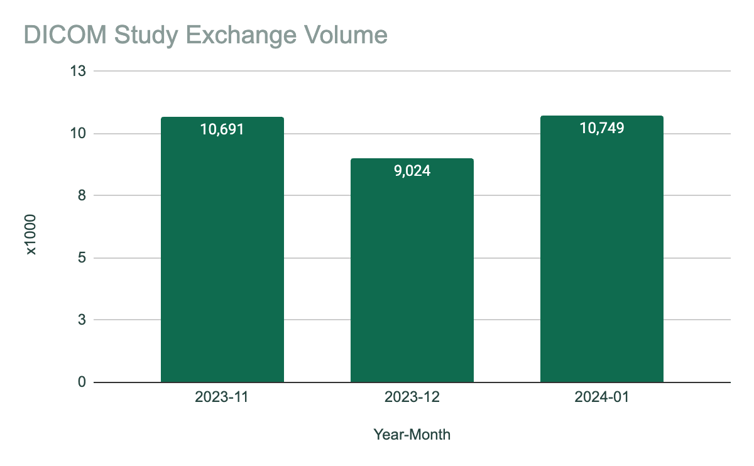
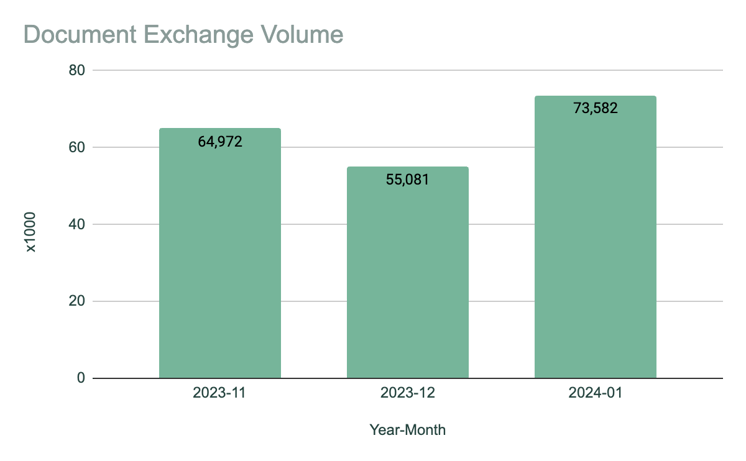
KPI 4 - Number of registered patient identifiers
This KPI gives insights into the total number of unique patients registered at each institution. As the data this KPI is based on is anonymised it is not traceable to individual patient records. Hence, the total number across all institutions cannot be corrected for duplicates. We therefor track both the Dutch unique Patient Identifier (referred to as BSN), and the health institution (local) Patient MRN.
The delta between the two indicates how many patients are registered without a known BSN. In absolute terms the number of local identifiers gives an indication of how many patient records are available and potentially accessible when complying with local data privacy regulations.
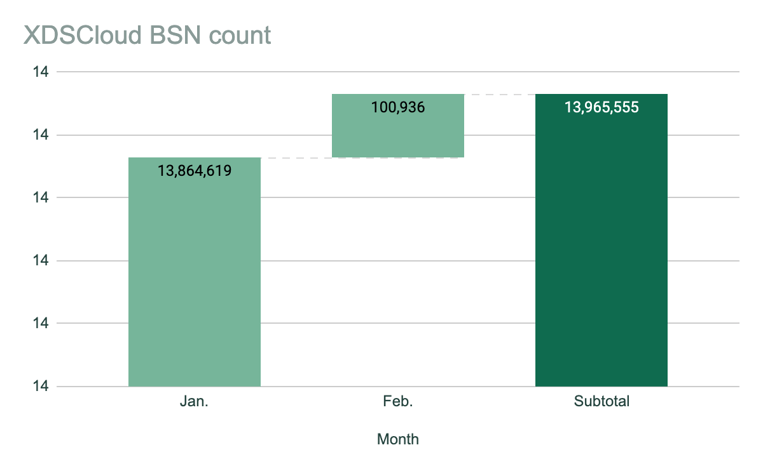
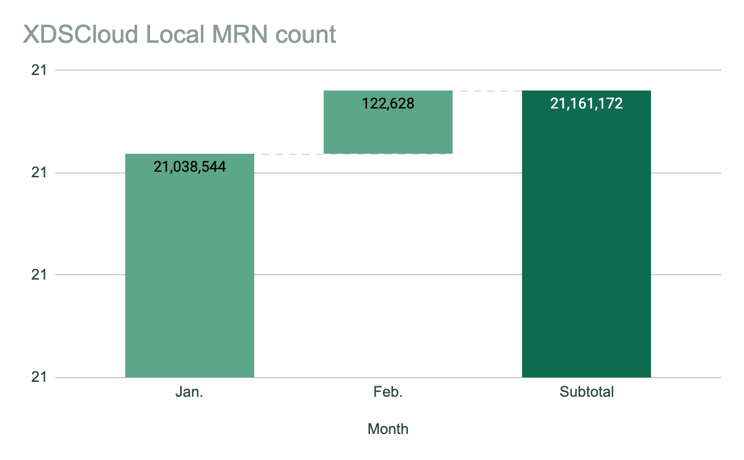
As of Jan. 1st 2024 over 13 million unique Dutch National Patient Identifiers were registered within the XDSCloud network. Throughout January approx. 100.000 patients were added to the XDSCloud network.
Conclusions
It is a bit too early to draw hard conclusions from these KPIs. As expected the number of registered documents and patient grows month over month. At some point the amount of registered patient should stabilise given that the total Dutch population is approx. 17 million. As more and more health institutions participate in a sharing agreement it is expected that the monthly amount of exchanges will increase.
Recent Posts
Author
Andries Hamster
Andries' expertise lies in the domain of "standards-based interoperability" to realize health information exchanges. Throughout his career he has been exposed to many interoperability standards such as DICOM, HL7 and he has been involved with IHE from the start.





